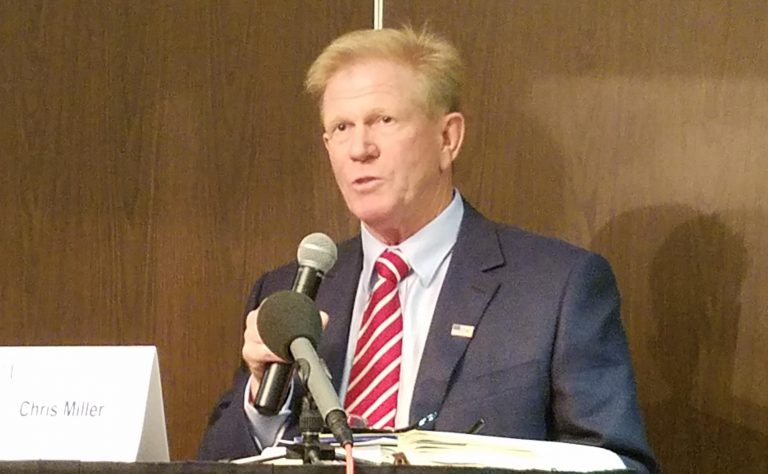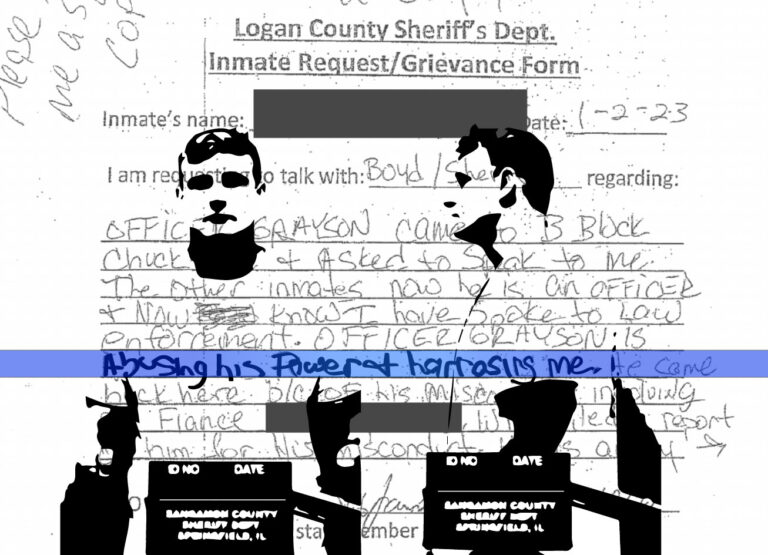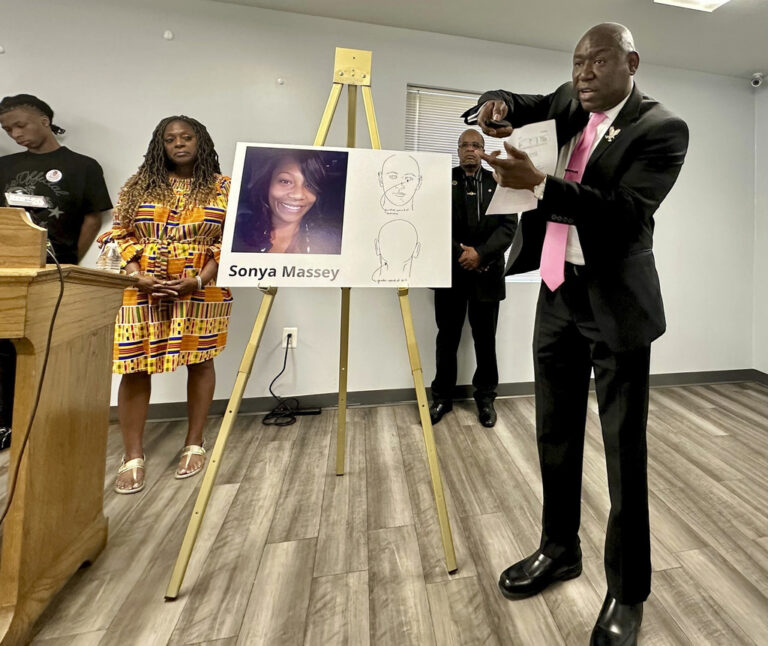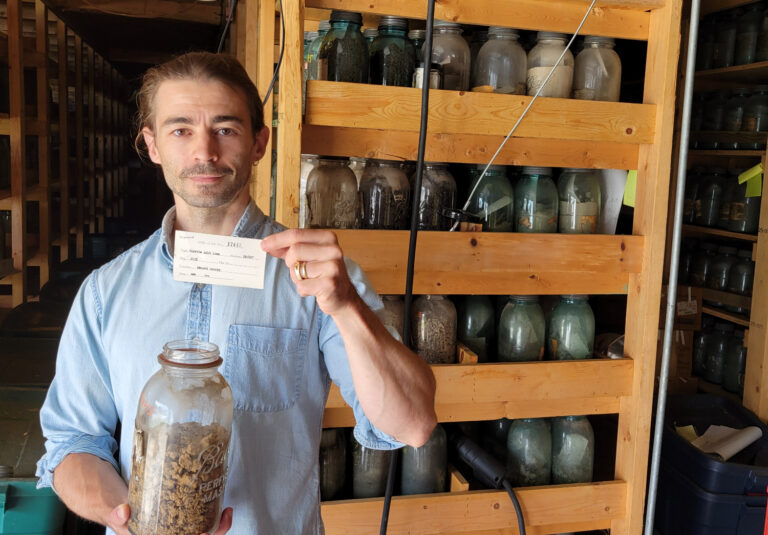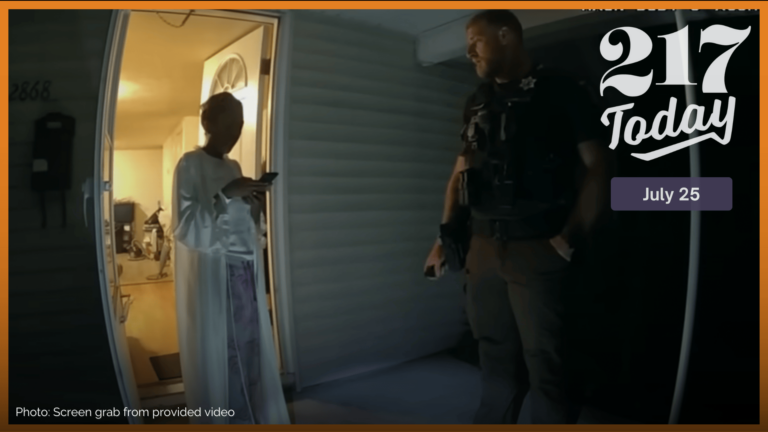URBANA — State Representative Chris Miller of Illinois’ 110th district won re-election in last week’s midterms. He ran unopposed and will soon serve his third term in office.
Miller, the Coles County Republican, attended the “Save America” rally in Washington D.C. on January 6, 2021, which preceded the attack on the U.S. Capitol Building.
A member of the Illinois Freedom Caucus, Miller spoke with Illinois Newsroom’s Harrison Malkin about January 6, which left five police officers and four crowd members dead. He also analyzed the results of the midterm election and offered an explanation for his wife, U.S. Congresswoman Mary Miller, not doing interviews with Illinois Public Media.
Malkin: First, I wanted to ask you about the midterm elections. I know you were in Springfield with your friend, Darren Bailey, who lost his race. And there didn’t seem to be the kind of red wave that people were talking about. Did you expect to see that outcome?
Miller: Well, I think the first thing that we have to, you know, (do is) admit that our projections, and our predictions were off. Actually, by a lot. But, you know, I think…you always have to look for the silver lining in some of these things. And I know that it’s pretty clear that Republicans made inroads in suburban women to Latinos and many other groups. And, you know, and it wasn’t that long ago, where Florida was kind of looked at as a swing state.
And it shows that at least, my takeaway from what happened in Florida is that conservatism is not dead. And conservative ideals aren’t dead. And I think that we can look at what Ron DeSantis did down there. And possibly the takeaway is, maybe that’s a blueprint, (to) make some improvements in the outcomes here in the state of Illinois.
Malkin: How much of what happened on Election Day is related or attributable to former President Donald Trump?
Miller: Oh, I don’t really think that much of that here in Illinois was. I know that and some of it (is) geographic too. For some reason, people…in suburban areas just love to hate on Trump. So, like, it was their favorite pastime. And up there, it seems like Trump derangement syndrome was alive and well…and where I live it’s just the opposite of that. Where I live, people love Trump and they appreciate the things that he did when he cut taxes, when he shored up the border.
Malkin: At the state level, where you’re at, some prominent Republicans, such as Jim Durkin and Tim Butler are stepping down. What do you think that means for the future of the state Republican Party?
Miller: Well, I think that one of the things is that conservative ideals are gaining traction, and we have a beachhead, established in Illinois with the Illinois Freedom Caucus where, you know…we’re emphasizing…our worldview, as well as the Constitution and the Bill of Rights and the Republican Party platform. And I know that we’re committed to those three ideals. It’s going to be our true north to guide that…some see their power structure falling apart, then rather than staying and trying to fix things, they’re going to move on and do something else.
Malkin: Do you think that creates some more space or opportunity for the Illinois Freedom Caucus?
Miller: Oh, I think so. I think that, you know, let’s face it, the ideals that we’re promoting with individual liberty, with limited government, with the rule of law, with fair markets, with fiscal responsibility, the sanctity of life and peace through strength. Those are ideals that make America America. And I think one of the things that we haven’t done very well is we haven’t communicated those ideals. Because let’s face it, most of the people that live here in the state of Illinois, those are ideals that they live by, as they raise their families and they work hard and those are the ideals that motivate us to do the right thing, the right way all the time.
Malkin: During the midterm election, there was a lot of talk around the 2020 presidential election. If you were a U.S. Congressman, would you have certified the election results and said yes, Joe Biden won the election.
Miller: Well, I think that that’s an ongoing topic of debate. You know, it’s like the…same conversation with Hillary, with Al Gore, and even way back with Richard Nixon and JFK. You know, the conversation was alive and well during those times. And, you know, in my mind, the clarion calls should be a wake up, when we can look at what happened in 2020. And it should be a wakeup call that we need to ensure our election systems work without any hiccups.
And I think that, again, what (Ron) DeSantis did in Florida…when the votes were counted, the elections were called that evening. We must work the next two years to ensure that we know the outcomes…in (the) election…that evening, because the longer things take, the more question marks people have in their mind.
Malkin: Do you still have questions about that (2020 presidential) election? Are you still uncertain that Joe Biden…
Miller: Oh, it’s one of those sayings, it’s a waste of energy. I mean, there’s an old proverb that says if you, if you live in the past, you lose an eye. If you forget the past, you lose both eyes. And so, it’s important to take the past and try to build for the future, to make sure that we have free and fair elections, and we don’t have hiccups. And we don’t have delays, and we count the votes.
And because there’s a lot of things that can be done to make people feel like their vote counts, people feel like that they’re not disenfranchised. And it seems like…it has been a real fiasco, the last two cycles in different places, not everywhere, but I think we need to look at the template of where they’re running good elections, where there doesn’t seem to be hiccups, where there’s not any questions marks made, because a lot of these question marks are self-inflicted by just not running things properly, and getting things done in a timely fashion.
Malkin: To your point, do you think certain Republicans, and perhaps Democrats, too, weren’t focusing as much on their ideology…and do you think that should have been the focus instead of talking so much and fixating so much on the last election?
Miller: Well, absolutely, I agree. I think that, you know, the focus should have been really not even on social issues, which the…Dems wanted to focus on that. In my mind, we should have been focusing on inflation, the invasion on our southern border, and incompetence and leadership. Because what we’ve witnessed in real time is a real attack on our safety and security, on quality education and on economic opportunity here in the state of Illinois. And to me, those are the things that we should have been focused on rather than all of the side issues that really don’t affect the quality of life of the everyday working-class people here in our state.
Malkin: You were at the “Save America” rally on January 6. How do you reflect on that day, almost a year later?
Miller: The Democrats were trying to push that there was an insurrection…I’ll tell you, if that was an insurrection, then I’ll kiss your old hind end on the town square and give you an hour to draw a crowd? Because, you know, and there was such hypocrisy in the reporting, because BLM burned down cities and Antifa, they were destroying American cities from coast to coast. And that (January 6) was a peaceful demonstration…99% of the people that were at that rally were old like I am. They were in their 60s and 70s.
(An ABC News analysis found that “comparisons between Black Lives Matter and what happened on Capitol Hill are false equivalencies.”)
And they were there to support the president and I was there, and what you saw reported on T.V. and what actually happened, there were two different things. But they were trying to create the narrative that, you know, the Trump’s people were evil, wicked and hateful. And most of the people who were there were just regular people from diverse backgrounds that were there to support the president and they felt like they were disenfranchised. I…actually sat on the front row and listened to all the speeches and it was actually (a) pretty inspiring time.
My wife had to leave to go back and make votes. And everything that was going on in the Capitol was going on before Trump even got on the stage. And so, to blame him for anything…I had two or three busloads of my constituents that came to the rally. And a bunch of them told me that the police had the doors open…and were waving people to come into the Capitol building.
(PolitiFact notes “we have not seen evidence that Capitol Police granted rioters access to the building or that they were “in on” the breach, as some posts claim…Footage that appeared to show some officers allowing rioters past barricades was misrepresented online.”)
And so, it’s like the reporting on this whole issue has been skewed. And it’s been only reported to maintain this narrative that there was an attempt at hostile takeover. And that was absolutely not true. Another thing too that I think it’s important to point out is that I was there after the “Save America” rally. And after they had built a wall around the Capitol building, and it was kind of ironic to me that (the) National Guard was there, but there wasn’t one person that had a clip in their gun or bullets in any of their weapons that they were carrying around. It was all optics and creating this illusion that there was a chance that there could be a group of people (trying to) come in and try to take over the Capitol, which was your smoke and mirrors.
Malkin: Did you feel regretful or conflicted after finding out or seeing some of the violence that did ensue and some of the deaths that occurred?
Miller: Well…that’s another thing that got misreported. Ashley Babbitt was another lady that was in a tunnel that got trampled. (She was) the real victim from my understanding. From talking to people in DC…the report that these policemen were killed there, it was all bogus, and it wasn’t true. But one thing I’ve noticed is that there’s a real lack of critical thinking too, because it’s like that we’re a bunch of parrots, and we hear something and we just pair it with (what) somebody else’s said, rather than actually drilling down on it. And so, what actually happened there and what has been the narrative that’s been created by the Democrats and as, as Trump would say, the fake news is a far cry from what really happened.
And I think that it’s really unfortunate that there was a situation created, because if they would have had boots on the ground, and they would have had the national guard there, that none of this would have happened, if given the proper response to that many people in one place at one time. There should have been steps taken to make sure that nothing like this could possibly happen. And from sitting in meetings, even with President Trump and hearing what actually went on (and) everything that happened that day (it) could have been prevented…
Malkin: On that day, I’m not sure if it is a Facebook Live or some other video, you describe the events as a “great cultural war to see which worldview will survive.” Can you just say a bit more about that?
Miller: Well, I think that’s true. And because, you know, of course, the report is ‘could you believe Chris Miller said this.’ You know, really, if you really take a minute and take a deep breath, maybe hydrate, and think about what’s being said: whoever controls the information, controls the people. And there are worldviews that drive the way we think, you know, because our worldview creates complex paradigms in our mind about the way the world should look. And different people have different ideals.
You know, I’m a Christian, and so, hopefully, my worldview is consistent with Judeo-Christian values. And if you’re, for example, if you’re a humanist, then those ideals that drive humanism is going to to motivate your worldview and the paradigms that you have in your mind about why government should work, about how we’re going to raise our families…all these different things drive the way that you think. And it’s true that in my mind anyway, at least for me, that there is a battle of worldview(s)…Whoever controls the information, controls the people.
Malkin: Besides the ideas that we spoke about before, is there something that you hoped would prevail that day (on January 6)?
Miller: The one thing that I would hope that we could understand as Americans is that we need to return to the place where we can have civil discourse, where we can have a free exchange of ideas and ideals…and one thing that President Trump did right is the cliche that he had: make America first. You know that idea of putting the American people first should not have any negative connotations. I mean, as public servants, I know that when I go to Springfield, I want to make sure that I do things that are in the best interest of my constituents, and not in the best interests of special interest groups, or any of the above. And so, I do think that we need…to take a deep breath and think about how we have become such a hostile culture…because let’s face it, not every idea that a Democrat has is a great idea. And not every idea that a Republican has is a great idea.
But there ought to be, we ought to be able to reach some common ground and come to the best conclusion. It’s going to benefit the hard-working people that live here in the state of Illinois, and I live here in the United States of America.
Malkin: I will say that you’ve graciously agreed to speak with me, not just today, but previously. But I have reached out to the office of your wife, Congresswoman Mary Miller, and never really gotten a response. I was never really able to reach her, so I’m curious why you think her office, and not necessarily her in particular, but her office had such a reluctance to grant me an interview during the campaign cycle?
(Mary Miller did not participate in debates during the 2022 primary or general election, and multiple other mainstream outlets were unable to interview her.)
Miller: Well, I have no idea and I can’t speak for Mary or her office. But the Champaign media has been over the top brutal. I mean, I could look out and say ‘boy, sure is a pretty day here in Illinois,’ and some of the media here in town would say…’could you believe Chris Miller said it was a nice day. I can’t believe he would say something so evolved. But I mean, that’s been typically the way. I mean, let’s face it, Mary and I are farmers from East Central Illinois.
This political deal is a brand-new thing for us and to just be treated like we’re part of the evil empire is beyond the pale. And, you know, I would love to be able to sit down with Champaign media on a weekly basis. And, like I mentioned to you, I’d love to be able to sit down with you once a week and just have an objective, this is what happened, this week in Springfield…but neither one of us have felt comfortable in doing that just because of the way we’ve been treated in the past.
Malkin: My only lingering question, though, would be do you think the Champaign-Urbana community, which definitely includes supporters of the Millers…deserve to hear directly from Congresswoman Miller?
Miller: I would say that leaders go first. And so, I’m going first to see how this opportunity is handled. And if we think it’s fair and objective, then I’m guessing that down in the future that the possibility of that taking place would get better…I’m not saying that we have to have a bunch of softball questions, but I think that as long as people are treated fairly, which we haven’t been in the past and.
And that’s the reason why I came on with you is to try to build a bridge, so we could have a level of communication here with our local people, because I have Champaign County now, and the new map…(has) Mahomet and a lot of the rural areas that are in Champaign County. And so that’s one of the reasons why I agreed to come on and have a conversation with you today.
Harrison Malkin is a reporter for Illinois Public Media. Follow him @HarrisonMalkin

